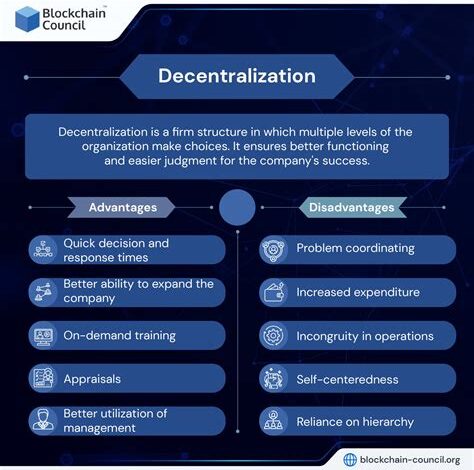Decentralization in Government: Benefits and Drawbacks

Learn about the definition, advantages, challenges, and impact of decentralization in government for improved efficiency, effectiveness, accountability, and coordination.In today’s political landscape, the concept of decentralization in government has gained significant attention. This blog post aims to explore the advantages and drawbacks of implementing decentralization in government systems. We will start by defining decentralization and its various forms. We will then delve into the benefits of decentralization, such as improved efficiency and effectiveness in public service delivery. However, with every system comes its challenges, and we will discuss the potential hurdles of decentralization in government. Moreover, we will also examine the impact of decentralization on accountability and coordination within public institutions. By examining these aspects, we hope to provide a comprehensive understanding of the complexities surrounding decentralization in government and its implications. Whether you are a student studying political science or a concerned citizen, this blog post will offer valuable insights into the intricacies of decentralized governance.
Definition of Decentralization
In the context of government, decentralization refers to the transfer of authority and responsibility for public functions from the central government to subordinate or quasi-autonomous government organizations. This can include local or regional governments, public agencies, or non-governmental organizations. The goal of decentralization is to distribute power and decision-making to smaller, more localized entities, ultimately providing a more participatory and responsive form of governance.
Decentralization can take many forms, including administrative, fiscal, and political decentralization. Administrative decentralization involves delegating decision-making authority and administrative responsibilities to local governments or agencies. Fiscal decentralization involves the allocation of revenue-raising powers and the distribution of financial resources to lower levels of government. Political decentralization entails the transfer of policy-making authority and electoral responsibilities to subnational entities.
Overall, decentralization is a complex process with various definitions and interpretations, but it generally aims to enhance local governance, promote citizen participation and accountability, and improve the delivery of public services.
Advantages of Decentralization in Government
Enhanced Decision Making: Decentralization in government allows decisions to be made at the local level, where officials are often more familiar with the needs and preferences of the community. This leads to policies that are better tailored to the specific needs of the people, ultimately resulting in more effective governance.
Improved Efficiency: By delegating decision-making authority to lower levels of government, decentralization can lead to more efficient use of resources. Local officials are often in a better position to prioritize and allocate resources based on the specific needs of their communities, leading to more effective and targeted use of public funds.
Promotion of Innovation: Decentralization encourages experimentation and innovation at the local level, as local officials have more flexibility to implement new ideas and policies. This can lead to the development of creative solutions to local problems and can serve as a testing ground for new policies that can later be scaled up to the national level.
Efficiency and Effectiveness
One of the major advantages of decentralization in government is the potential for increased efficiency and effectiveness. When decision-making and authority are dispersed across multiple levels of government, it allows for more rapid response to local needs and preferences. This can result in policies and services that are more tailored to the specific needs of different communities, leading to greater overall efficiency in the delivery of public goods and services.
Furthermore, decentralization can lead to greater effectiveness in governance by promoting greater innovation and experimentation at the local level. Local governments are often in a better position to understand the unique challenges and opportunities facing their communities and can develop and implement policies that are more responsive to these local dynamics, ultimately resulting in more effective governance and policy outcomes.
However, it’s important to note that while efficiency and effectiveness are potential benefits of decentralization, they are not guaranteed outcomes. Decentralization can also introduce complexities and challenges that may impede efficiency and effectiveness, such as coordination issues between different levels of government and potential duplication of efforts. It requires careful planning and management to realize the full benefits of efficiency and effectiveness in a decentralized governance system.
Challenges of Decentralization
Decentralization in government can bring about many benefits, but it also comes with its fair share of challenges. One of the main challenges is the potential for increased inequality among different regions. When power and decision-making authority are distributed to local governments, it can create disparities in resource allocation and service delivery. This can result in some regions receiving better services and infrastructure, while others are left behind, leading to social and economic imbalances.
Another challenge of decentralization is the risk of corruption and mismanagement at the local level. When authority is devolved to smaller entities, there is a greater potential for misconduct and misuse of public funds. Lack of oversight and accountability mechanisms can lead to inefficiencies and wastage of resources, ultimately undermining the goals of decentralization.
Additionally, decentralization can pose challenges to coordination and harmonization of policies and programs across different regions. Without proper mechanisms for collaboration and cooperation, there is a risk of duplication of efforts and conflicting policies, which can hinder overall development and progress. Finding the right balance between autonomy and coordination is crucial in addressing this challenge.
Impact on Accountability and Coordination
Decentralization in government can have a significant impact on accountability and coordination within the system. When power and decision-making authority are distributed among multiple levels of government, it can become more challenging to ensure that all parties involved are held accountable for their actions. This can lead to a lack of transparency and oversight, making it difficult to track and address potential issues or misconduct.
Additionally, decentralization can also impact the coordination of efforts and resources across different levels of government. Without a centralized authority to oversee and align activities, there may be duplication of efforts, inefficient use of resources, and conflicting policies or regulations. This can lead to a disjointed approach to governance and public service delivery, ultimately impacting the effectiveness of government operations.
While decentralization can empower local governments and promote citizen participation, it is important to carefully consider its impact on accountability and coordination. Strategies and mechanisms must be put in place to address these challenges and ensure that decentralized governance remains accountable, transparent, and efficient.





